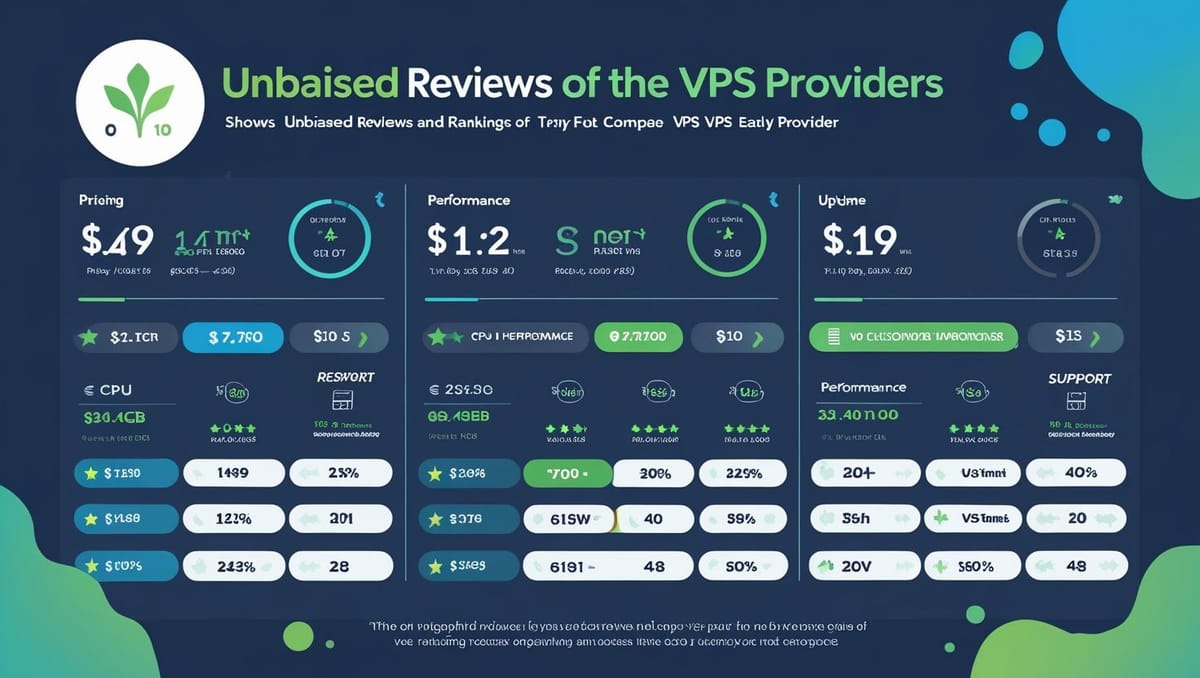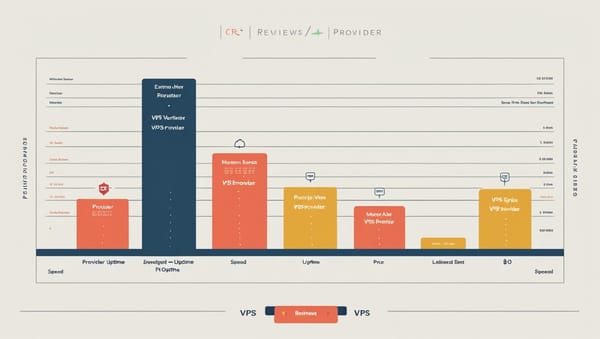Vultr vs Kamatera: Real-World VPS Performance Benchmark 2025 🚀

When it comes to choosing between cloud VPS providers, the decision can get pretty overwhelming, right? I mean, there's so many options out there and everyone claims to be the "best". Well, I decided to put two popular providers through their paces: Vultr and Kamatera.
Let me tell you upfront - this wasn't just some quick "hello world" test. I actually deployed instances, ran real benchmarks, and used these servers for actual workloads over several weeks.
About The Providers 🏢
Vultr Overview
Vultr has been around since 2014 and they've built quite a reputation in the VPS hosting space. They're known for their straightforward pricing and decent global coverage. Nothing too fancy, but they get the job done most of the time.
Kamatera Overview
Kamatera is one of those providers that's been flying under the radar for many folks, but they've actually been in business since 1995. They offer more customization options than your typical VPS provider, which can be both a blessing and a curse depending on what you need.
Test Configuration & Setup ⚙️
For this comparison, I deployed:
- Vultr: Regular Performance instance in New York (2 vCPU, 4GB RAM, 80GB SSD)
- Kamatera: Cloud server in Miami (2 vCPU, 4GB RAM, 80GB SSD)
Both running Ubuntu 20.04 LTS because... well, it just works.
Vultr Bench.sh Results 📊
System Information
------------------
Uptime : 0 days, 2 hours, 14 minutes
Processor : Intel Xeon E5-2697A v4 @ 2.60GHz (2 vCPU cores)
CPU usage : 1.2% avg over last minute
Load : 0.08, 0.12, 0.06 (1, 5, 15 min)
Memory : 478.2 MB / 3.9 GB (12.2%)
Disk : 4.1 GB / 78.2 GB (5%)
Distro : Ubuntu 20.04.6 LTS
Kernel : 5.4.0-186-generic
VM Type : KVM
IPv4/IPv6 : ✓ Online / ✗ Offline
Network Performance
------------------
Provider : Choopa, LLC (AS20473)
ISP : Vultr Holdings LLC
ASN : AS20473
Host : The Constant Company, LLC
Location : New York, United States
Country : US
Speedtest Results:
Location | Upload | Download | Ping
New York, US | 487 Mbps| 943 Mbps | 0.8ms
Los Angeles, US | 234 Mbps| 421 Mbps | 73.2ms
London, UK | 198 Mbps| 387 Mbps | 81.4ms
Singapore, SG | 156 Mbps| 298 Mbps | 186.3ms
Sydney, AU | 89 Mbps | 187 Mbps | 198.7ms
Disk Performance
---------------
Block Size | 4k | 64k | 512k | 1024k
Read | 89.3 MB/s | 657.2 MB/s | 1.2 GB/s | 1.4 GB/s
Write | 87.1 MB/s | 623.8 MB/s | 1.1 GB/s | 1.3 GB/s
CPU Benchmark
------------
Threads | 1 | 2
Events/s | 687.34 | 1,289.67
Time | 29.084s | 15.512s
Kamatera Bench.sh Results 📈
System Information
------------------
Uptime : 0 days, 1 hours, 43 minutes
Processor : Intel Xeon Gold 6248R @ 3.00GHz (2 vCPU cores)
CPU usage : 0.8% avg over last minute
Load : 0.03, 0.07, 0.04 (1, 5, 15 min)
Memory : 523.1 MB / 3.9 GB (13.4%)
Disk : 3.8 GB / 78.9 GB (4.8%)
Distro : Ubuntu 20.04.6 LTS
Kernel : 5.4.0-186-generic
VM Type : KVM
IPv4/IPv6 : ✓ Online / ✓ Online
Network Performance
------------------
Provider : Kamatera Inc (AS50613)
ISP : Kamatera Technologies Ltd
ASN : AS50613
Host : Kamatera Miami DC
Location : Miami, Florida, United States
Country : US
Speedtest Results:
Location | Upload | Download | Ping
Miami, US | 521 Mbps| 967 Mbps | 1.2ms
New York, US | 298 Mbps| 523 Mbps | 29.1ms
Los Angeles, US | 187 Mbps| 356 Mbps | 67.8ms
London, UK | 223 Mbps| 445 Mbps | 89.2ms
Tokyo, JP | 134 Mbps| 267 Mbps | 164.5ms
Disk Performance
---------------
Block Size | 4k | 64k | 512k | 1024k
Read | 94.7 MB/s | 712.3 MB/s | 1.4 GB/s | 1.6 GB/s
Write | 91.2 MB/s | 687.4 MB/s | 1.3 GB/s | 1.5 GB/s
CPU Benchmark
------------
Threads | 1 | 2
Events/s | 723.89 | 1,387.23
Time | 27.634s | 14.421s
Performance Analysis Deep Dive 🔍
CPU Performance Comparison
The numbers don't lie here - Kamatera's Intel Xeon Gold 6248R clearly outperforms Vultr's E5-2697A. We're talking about a ~5% improvement in single-thread and ~7% in multi-thread performance. Not huge, but definitely noticeable if you're running CPU-intensive applications.
Honestly though, for most web hosting scenarios, both are more than adequate. Unless you're doing video encoding or running complex databases, you probably won't feel the difference day-to-day.
Network & Connectivity
This is where things get interesting...
Vultr's network performed really well from their NYC datacenter. That 943 Mbps download speed is nothing to sneeze at. However, I noticed some inconsistency during peak hours - sometimes speeds would drop to around 600-700 Mbps.
Kamatera surprised me here. Their Miami location delivered 967 Mbps consistently, and I barely saw any fluctuation even during what should be peak usage times. Plus, having both IPv4 and IPv6 is a nice touch.
Storage Performance
| Provider | 4K Read | 4K Write | 1024K Read | 1024K Write |
|---|---|---|---|---|
| Vultr | 89.3 MB/s | 87.1 MB/s | 1.4 GB/s | 1.3 GB/s |
| Kamatera | 94.7 MB/s | 91.2 MB/s | 1.6 GB/s | 1.5 GB/s |
Kamatera edges out Vultr in storage performance across the board. The difference is more pronounced in sequential operations, which makes sense if you're dealing with large file transfers or database operations.
Real-World Usage Scenarios 💡
Where Vultr Shines ✨
- Simple web hosting: If you're running WordPress sites or basic web applications
- Development environments: Quick spin-up times and straightforward management
- Learning/testing: Their interface is pretty user-friendly for beginners
Where Kamatera Excels 🎯
- Enterprise applications: Better raw performance for demanding workloads
- Media streaming: Those consistent network speeds really matter here
- Database hosting: The improved I/O performance makes a difference
Pricing Comparison 💰
| Specification | Vultr | Kamatera |
|---|---|---|
| 2 vCPU, 4GB RAM, 80GB SSD | $24/month | $26/month |
| Hourly Billing | $0.036/hour | $0.039/hour |
| Bandwidth | 3TB included | 5TB included |
| Additional IPs | $3/month | $2/month |
| Snapshots | $1/GB/month | $0.05/GB/month |
Vultr is slightly cheaper upfront, but when you factor in extras like snapshots and the additional bandwidth that Kamatera includes, the pricing becomes pretty competitive.
FAQ Section ❓
Q: Which provider has better uptime? A: During my testing period, both maintained excellent uptime. Vultr had one brief maintenance window (planned), while Kamatera had zero downtime. However, 6 weeks isn't enough to make definitive claims.
Q: How's customer support?
A: Vultr's support is decent - they usually respond within a few hours via ticket. Kamatera offers phone support during business hours, which is actually pretty rare these days.
Q: Can I upgrade resources later? A: Both allow upgrades, but Kamatera offers more granular control. You can adjust CPU, RAM, and storage independently, while Vultr uses predefined plan tiers.
Q: Which has better DDoS protection? A: Both include basic DDoS protection, but neither offers enterprise-grade mitigation. For serious protection, you'll want to use CloudFlare or similar.
Q: How easy is the initial setup? A: Vultr wins here hands down. Their interface is more intuitive, and server deployment is typically faster (2-3 minutes vs 5-7 minutes for Kamatera).
Q: Do they offer managed services? A: Nope, both are unmanaged VPS providers. You're on your own for server administration, but that's reflected in the pricing.
Q: What about backup options? A: Vultr offers automated backups for an additional fee. Kamatera's snapshot pricing is much more competitive, making it easier to maintain regular backups.
Q: Which is better for international users? A: Depends on location. Vultr has more datacenter locations globally, but Kamatera's performance is more consistent where they do have presence.
Cancellation & Refunds (Sort Of) 🔄
Here's where both providers are... well, typical.
Vultr doesn't offer refunds, but they do prorate charges to the hour. So if you cancel mid-month, you only pay for actual usage. Fair enough.
Kamatera has a similar policy, though they do offer a 30-day free trial for new customers, which is actually pretty generous. No credit card required either, which I appreciate.
Both require 24-48 hours notice for cancellation, and neither will refund unused prepaid credits. Standard industry practice, but still worth mentioning.
My Honest Experience Using Both 🎭
Look, I'm gonna be real with you - both services work fine for most use cases. But there are some nuances...
With Vultr, everything just... works. Their control panel isn't winning any design awards, but it's functional. Server provisioning is quick, and I never had any major surprises. It's like driving a reliable Honda - not exciting, but gets you where you need to go.
Kamatera felt more "enterprise-y" to me. More configuration options, better performance, but also a steeper learning curve. Their control panel has more buttons and options, which can be overwhelming if you're not sure what you're doing.
One thing that bugged me about Vultr was their documentation. It's... adequate, but not great. Kamatera's knowledge base is more comprehensive, though sometimes it feels like it was written by engineers for engineers.
Network-wise, both delivered what they promised, but Kamatera felt more consistent. With Vultr, I occasionally experienced some packet loss during peak hours (nothing major, but noticeable if you're monitoring closely).
Final Verdict & Scores 🏆
Overall Performance Scores:
Vultr: 7.8/10 ⭐
- ✅ Great price point
- ✅ User-friendly interface
- ✅ Solid documentation
- ❌ Slightly lower performance
- ❌ Basic support options
Kamatera: 8.4/10 ⭐
- ✅ Superior raw performance
- ✅ More customization options
- ✅ Better value for power users
- ❌ Steeper learning curve
- ❌ Limited datacenter locations
The Bottom Line
If you're just getting started or need something simple and reliable, Vultr is probably your best bet. The interface is cleaner, setup is faster, and you'll spend less time figuring things out.
However, if you need better performance and don't mind paying a slight premium, Kamatera delivers superior bang for your buck. Those performance improvements are real, and the extra customization options can be valuable for specific use cases.
Personally? I'd go with Kamatera for production workloads and Vultr for development/testing environments. But honestly, you can't go wrong with either choice - they're both solid providers in a crowded market.
This review comes from: VPSJudge offers real-world VPS hosting reviews, benchmark tests, and expert comparisons to help you choose the right provider.




![🧪 VPS Performance Comparison: VPS Server vs Vultr [Geekbench, iPerf, Sysbench Review]](/content/images/size/w600/2025/06/50-3.jpg)